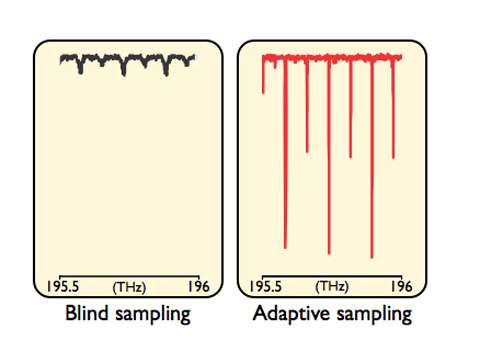Portion of a dual-comb real-time absorption spectrum of acetylene in the near-infrared region. While the spectrum without the adaptive sampling (blind sampling) is strongly distorted, the adaptive spectrum accurately reveals the molecular profiles. Credit: MPQ, Laser Spectroscopy Division
MPQ-scientists record broad absorption spectra on a microsecond scale with two laser frequency combs.
A team of scientists around Dr. Nathalie Picqué and Prof. Theodor W. Hänsch at the Laser Spectroscopy Division of the Max Planck Institute of Quantum Optics (Garching), in a collaboration with the Ludwig-Maximilians-Universität Munich and the Institut des Sciences Moléculaires d'Orsay (France) now reports on a new method of real-time identification and quantification of molecular species .
In recent years, a new spectroscopic technique, called dual-comb spectroscopy, has demonstrated a very exciting potential for ultra-rapid recording of complex molecular spectra. Compared to the state-of-the-art instrumentation, Fourier transform spectroscopy, recording times could be shortened from seconds to microseconds. Dual-comb spectroscopy without moving parts harnesses two laser frequency combs, coherent sources that emit a regular train of ultrashort pulses, to perform interferometric measurements. However, the technique of dual-comb spectroscopy has not realized its full potential yet, mostly because it is difficult to synchronize the two comb lasers within the required precision. The MPQ scientists have now developed a new approach to adaptive sampling, so that they are able to use unstabilized free-running femtosecond lasers without sacrificing performance. By generating proper clock signals, they compensate for laser short-term instabilities by electronic signal processing only.
This demonstrated possibility of using femtosecond lasers without any sophisticated stabilization scheme considerably eases the implementation of a dual-comb spectrometer. "It should facilitate applications to real-time sensing," comments Takuro Ideguchi, who just completed his doctoral dissertation, partly based on this experiment. "Dual-comb spectroscopy holds much promise for new approaches to molecular physics and our scheme of adaptive sampling is a key to their efficient implementation. Enhanced sensitivity for weak concentrations is within reach with the development of mid-infrared frequency combs, while nonlinear dual-comb spectroscopy provides intriguing prospects for applications ranging from bio-imaging to precision spectroscopy", Takuro Ideguchi adds.
More information: Nature Communications 5, 3375 – Feb. 27, 2014. DOI: 10.1038/ncomms4375
Journal information: Nature Communications
Provided by Max Planck Society






















